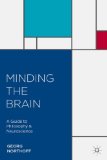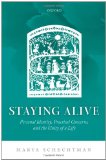May 25, 2014

Minding the Brain: A Guide to Philosophy and Neuroscience by Georg Northoff (Palgrave Macmillan, 2014)
(amazon.co.uk)
Book description from the publisher:
This book explores how the relationship between philosophy and the brain can inform neuroscience, the mind-brain problem and debates about consciousness. Written in a lively style with extensive pedagogy to explain complex concepts, this is interesting reading for students and researchers of psychology, neuroscience and philosophy.
Table of Contents:
Introduction
PART I: MIND AND BRAIN – FROM PHILOSOPHY THROUGH NEUROSCIENCE TO NEUROPHILOSOPHY
1. Philosophy and the Mind – Philosophy of Mind and Phenomenology
2. Philosophy and Science – Naturalism
3. Mind, Brain and Science – Psychology and Neuroscience
4. Brain and Philosophy – Neurophilosophy
PART II: MIND-BRAIN PROBLEM – FROM PHILOSOPHY OF MIND TO PHILOSOPHY OF BRAIN
5. Mental Approaches to the Mind-brain Problem
6. Physical and Functional Approaches to the Mind-brain Problem
7. Non-mental and Non-physical Approaches to the Mind-brain Problem
8. Brain-based Approaches to the Mind-brain Problem
PART III: PHILOSOPHY OF PSYCHOLOGY AND NEUROSCIENCE – FROM EXPLANATION OF MIND TO EXPLANATION OF BRAIN
9. Philosophy of Psychology – Personal Versus Subpersonal Levels of Explanation
10. Philosophy of Psychology – Mind and Meaning
11. Philosophy of Neuroscience – Explanations, Concepts, and Observer in Neuroscience
12. Philosophy of Brain – Characterization of the Brain
PART IV: NEUROPHILOSOPHY OF CONSCIOUSNESS – FROM MIND TO CONSCIOUSNESS
13. Arguments against the Reduction of Consciousness to the Brain
14. Neural Correlates of Consciousness (NCC)
15. Neural Predispositions of Consciousness (NPC)
16. Conceptual, Phenomenal, and Methodological Issues in the Investigation of Consciousness
PART V: NEUROPHILOSOPHY OF SELF – FROM CONSCIOUSNESS TO SELF
17. Brain and Self
18. Brain and Self-consciousness
19. Abnormalities of Self and Brain in Psychiatric Disorders
20. Brain and Intersubjectivity
Epilogue: Is the Brain a Door Opener?
See also: Author’s website
Comments (0)
- consciousness,new books,philosophy of mind,self
May 22, 2014

Acts of Consciousness: A Social Psychology Standpoint by Guy Saunders (Cambridge University Press, 2014)
(kindle ed.), (amazon.co.uk),
Book description from the publisher:
Drawing on compelling material from research interviews with former hostages and political prisoners, Guy Saunders reworks three classic thought experiment stories: Parfit’s ‘Teleporter’, Nagel’s ‘What is it like to be a bat?’ and Jackson’s ‘Mary the colour scientist’ to form a fresh look at the study of consciousness. By examining consciousness from a social psychology perspective, Saunders develops a ‘cubist psychology of consciousness’ through which he challenges the accepted wisdom of mainstream approaches by arguing that people can act freely. What makes ‘cubist psychology’ is both the many examples taken from different viewpoints and the multiple ways of looking at the key issues of person, mind and world. This is a unique and engaging book that will appeal to students and academics in the field of consciousness studies and other readers with an interest in consciousness.
Google Books preview:
Comments (0)
- consciousness,new books,psychology,self
May 19, 2014

Staying Alive: Personal Identity, Practical Concerns, and the Unity of a Life by Marya Schechtman (Oxford University Press, 2014)
(amazon.co.uk)
Book description from the publisher:
Judgments of personal identity stand at the heart of our daily transactions. Family life, friendships, institutions of justice, and systems of compensation all rely on our ability to reidentify people. It is not as obvious as it might at first appear just how to express this relation between facts about personal identity and practical interests in a philosophical account of personal identity. A natural thought is that whatever relation is proposed as the one which constitutes the sameness of a person must be important to us in just the way identity is. This simple understanding of the connection between personal identity and practical concerns has serious difficulties, however. One is that the relations that underlie our practical judgments do not seem suited to providing a metaphysical account of the basic, literal continuation of an entity. Another is that the practical interests we associate with identity are many and varied and it seems impossible that a single relation could simultaneously capture what is necessary and sufficient for all of them. Staying Alive offers a new way of thinking about the relation between personal identity and practical interests which allows us to overcome these difficulties and to offer a view in which the most basic and literal facts about personal identity are inherently connected to practical concerns. This account, the ‘Person Life View’, sees persons as unified loci of practical interaction, and defines the identity of a person in terms of the unity of a characteristic kind of life made up of dynamic interactions among biological, psychological, and social attributes and functions mediated through social and cultural infrastructure.
Google Books preview:
Life Story video: Bruce Hood, Galen Strawson, Marya Schechtman
Comments (0)
- new books,self





